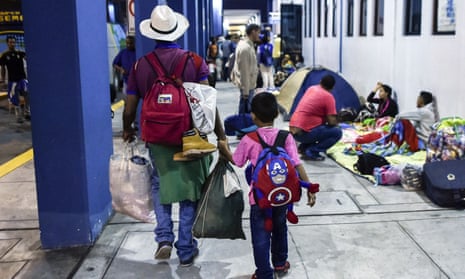As Venezuela slumps further into crisis, White House officials from Donald Trump down have made repeated expressions of support for the country’s people.
But such comments stand in stark contrast to the meager help the US government is giving Venezuelans seeking refuge in the US.
The United Nations estimated 5.3 million Venezuelans will have fled by the end of 2019, but the Trump administration has resisted calls – including those from Republicans – to put in place immigration programs that would let a tiny portion of them seek protection in the US.
Instead, its efforts have been focused on pushing for opposition leader, Juan Guaidó, to replace Nicolás Maduro, and repeating calls for the “freedom” of Venezuelans, who face chronic food and medicine shortages in the collapsing country.
The administration has resisted using Temporary Protected Status (TPS), a designation that allows people of a certain nationality to remain in the US because of extraordinary circumstances in their home country.
It has also ignored its ability to give the population special prioritization in its shrinking refugee system. Asylum seekers and the people who represent them have warned Venezuelans are trapped in a cycle of delayed processing times or outright denials of legitimate cases.
“Here you have the administration standing with Venezuelans seeking freedom – and banning them from seeking that freedom in the United States,” said Nazanin Ash, the International Rescue Committee’s (IRC’s) vice-president of policy and advocacy.
“What this administration has demonstrated again and again over the last several years is that crises and vulnerability … have not been the factors that have moved them,” Ash said.
The US government’s most straightforward option is TPS, which can be designated unilaterally by the homeland security secretary. It would protect 72,000 Venezuelans currently in the US, according to the IRC. The president can also use a similar program, Deferred Enforced Departure, to prevent people from being deported for a specific amount of time.
Without TPS or DED, Venezuelans can also seek asylum, if they meet the threshold of fearing persecution because of their race, religion, nationality, political opinion or social group. Poverty or needing medicine for a sick child would not meet that threshold.
From February 2018 to January 2019, more than 25,000 Venezuelans sought asylum in the US – more than from any othercountry, according to government records. That does not include Venezuelans who sought asylum in deportation hearings.
Unlike the crowds of Central Americans seeking asylum at the border, Venezuelan asylum cases overwhelmingly involve people who are already in the US, probably having arrived on a legal visa.
Francisco Sandoval was a professor and an attorney for opponents to Maduro’s predecessor, Hugo Chávez. Sandoval said he also threw rocks at Chavistas during political rallies in the early 2000s, something he now regrets.
The 51-year-old fled Venezuela last year because he feared political persecution and feared for his health after going without medicine for a chronic, life-threatening medical condition for three months.
He has been volunteering at Legal Services NYC, translating legal documents and assisting Venezuelans. But his asylum application sits in limbo, following an interview in December. And the tourist visa he used to travel to the US has expired.
The Trump administration has characterized asylum as an abused program, riddled with loopholes. Sandoval insists that it is his last resort.
“I never wanted to come over here,” Sandoval said. “I had a life over there. I had a beautiful life over there. I was someone. So, am I going to start over again at this age?”
He hopes Maduro’s regime will be overthrown soon, so he can return home. In the meantime, he is in constant contact with his wife, daughter and 89-year-old mother via WhatsApp.
He can’t speak about them without crying. His doctors in the US told him he needs treatment for depression, but he doesn’t see any solution to his sadness other than being reunited with his family or returning to a safer version of Venezuela. “Having my wife and my daughter here would be a better treatment than any drug,” Sandoval said.
Rebecca Press, a New York City immigration attorney who has represented about 18 Venezuelans in the past 18 months, said many Venezuelans wouldn’t need TPS because their asylum claims are so strong.
“I have many egregious examples of people shot at, left for dead, repeated physical attacks over a number of years, their homes being shot up during political opposition meetings, followed by physical harm,” Press said.
The majority of the cases were denied by an asylum officer then sent to immigration court, where it could take years for a case to be heard because of a massive case backlog, she said.
“From my perspective it is shocking that this is routine given the strength of the applications that have been referred to immigration court,” Press said. “It is disgusting.”
It also reflects the gap between what the US government is doing and what it is saying.
Since becoming president, Trump has tweeted about Venezuela 21 times – more than he has about rest of South America, combined. In February, Trump tweeted: “The people of Venezuela are standing for FREEDOM and DEMOCRACY – and the United States of America is standing right by their side!”

The state department said in an email that the US is the largest donor to the humanitarian crisis response in Venezuela, having spent more than $256m since late 2016. “We are focused on transformation in Venezuela and getting that country back on the road to stability for the benefit of all Venezuelans.”
The White House did not respond to a request for comment.
Without immigration programs targeting Venezuelans, Sandoval and others like him are at risk of being deported when their visas expire.
The special envoy Elliott Abrams, who is leading US diplomatic efforts in Venezuela, has warned that such deportations would reflect poorly on the US government, according to emails seen by the Wall Street Journal. Abrams said: “We have absolutely got to avoid any non-criminal deportations while we sort it out. To send some family back to [Venezuela] now would make us all laughingstocks.”









